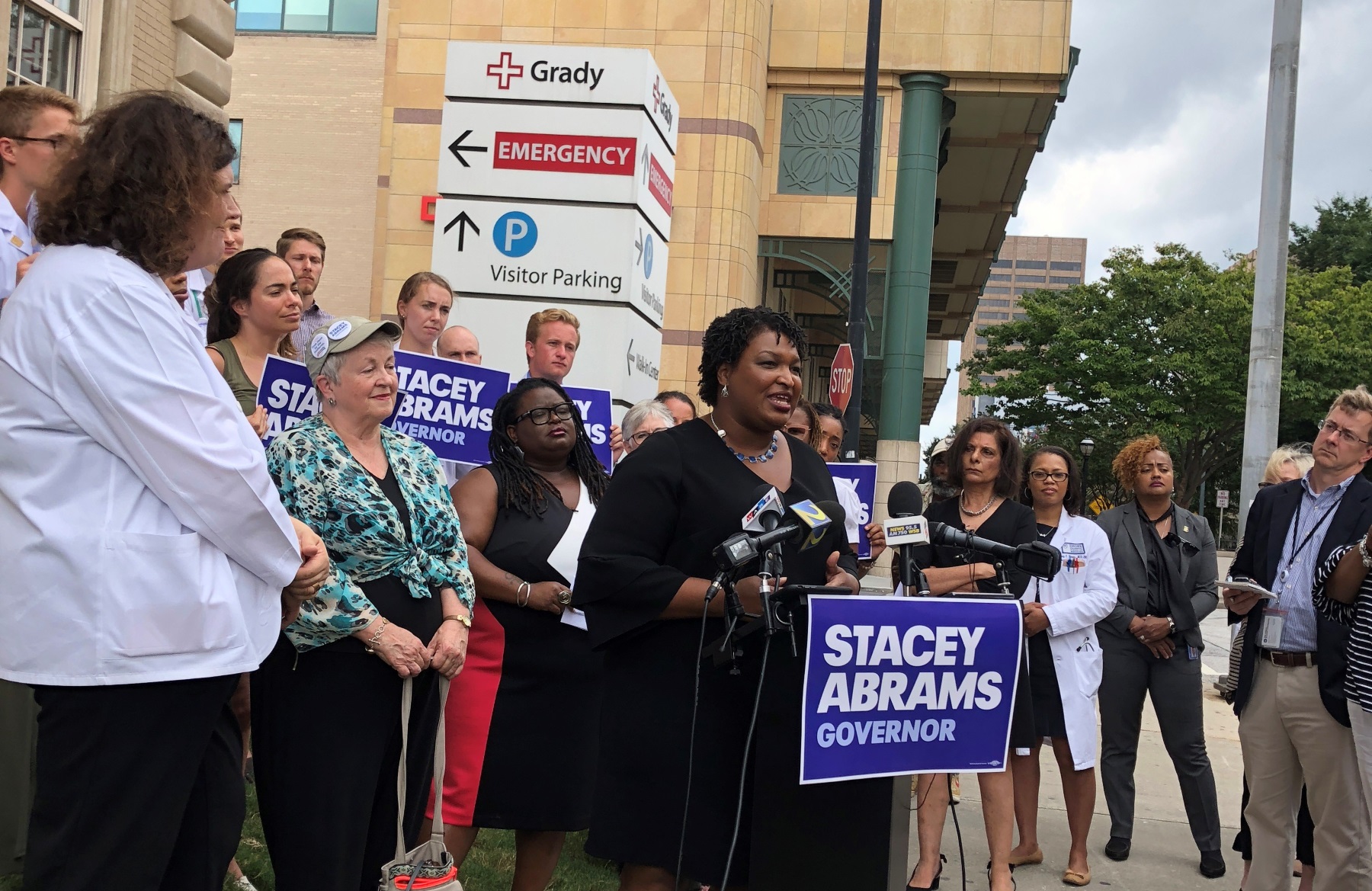Medicaid Expansion And The Georgia Governor’s Race

Democratic gubernatorial candidate Stacey Abrams held a health care policy press conference outside of Grady Memorial Hospital. She calls Medicaid expansion “fundamental” to fixing many of Georgia’s health care issues. Her opponent, Republican Brian Kemp, does not support Medicaid expansion, but favors opening up the private sector market to more competition to lower health care costs.
Emma Hurt / WABE
Health care policy has played a big role in the campaign for Georgia’s next governor. One issue that keeps coming up in that conversation? Medicaid expansion.
Democratic candidate Stacey Abrams has said the first thing she would do as governor is expand Medicaid. That’s the decision each state can make to give more low-income people access to health care. States receive federal funding for it, though they, too, have to pay into the program.
“And you’ll hear me talk about this ad nauseam because it’s the only answer to Georgia’s challenges,” Abrams said at a health care policy press conference Monday. “We have an uncompensated care rate of $1.7 billion.”
She called Medicaid expansion “fundamental” to solving many of Georgia’s health care issues, including mental health and substance abuse treatment, a high maternal death rate and rural health care access.
“If we expand Medicaid in the state of Georgia, we will draw down $3 billion per year. And we currently forfeit $8 million per day by saying no to Medicaid. Those are dollars that Georgia families have already paid into a system that we’re not benefiting from.”

According to a January Atlanta Journal-Constitution poll, about three-fourths of Georgians support Medicaid expansion. Seventeen states have chosen not to adopt Medicaid expansion, though three are considering it.
Republican Gov. Nathan Deal has refused to expand the program in Georgia, and Republican candidate Brian Kemp said he wouldn’t expand it either.
“Government programs that aren’t working now are not a reason to give them more money,” Kemp said at an event last week.
Kemp said, instead, he favors opening up the private sector market to more competition to lower health care costs.
“That way, you can look at things like increasing the provider rate,” he said. “I mean, if we expand a government program where doctors are not taking the patients because they’re losing money, what good is that going to do? That’s an approach that’s not going to work.”
Abrams responded to this argument by calling it a “willful ignorance about how health care works in Georgia. Georgia is a state that has relied heavily on both state and federal dollars to fund our health care system because we have a high poverty rate,” she said.
“We often hear that argument, that why would you want to expand a broken system. If hospitals and other Medicaid providers are only paid on average 85 cents on the cost of every dollar of providing that medical care, why would you want to put more people on the Medicaid rolls?” said Ethan James, vice president of external affairs at the Georgia Hospital Association.
“The people we’re putting on the Medicaid rolls, remember, are the uninsured right now. They don’t have access to health care insurance … we get zero cents on the dollar. And as any business will tell you, you’d rather get some payment than no payment.”
The Georgia Hospital Association does not endorse candidates, he said, and it has not given any money to either gubernatorial candidate.
Tom Price is a former Georgia lawmaker, congressman and, most recently, secretary of Health and Human Services.
He said Medicaid expansion is one issue, but the real problem is the 1.4 million Georgians without health coverage.
“That’s the fundamental problem. And whether it’s through Medicaid expansion in a creative way that’s responsible, or whether it’s through some other program that makes it so we can use resources in a more responsible and efficient manner, I don’t know that that makes a whole lot of difference to me so long as we do it in a way that solves the problem.”
Jimmy Lewis, CEO of Hometown Health, a Georgia-based network of rural hospitals, said he’s hearing more about health care in this election than any other recently, particularly about Medicaid expansion.
“Depending upon who you listen to, Medicaid expansion has in other states has been really successful, and/or some have reported that it has not been quite so successful,” he said.
Would it work in Georgia?
“That’s a high-level decision that the electorate has to make,” Lewis said. “That truly will come down to the end as to what the electorate understands and which one it wants to support.”








